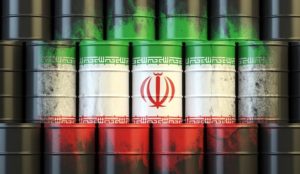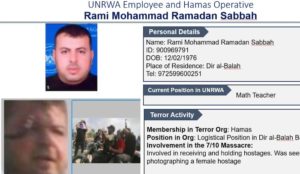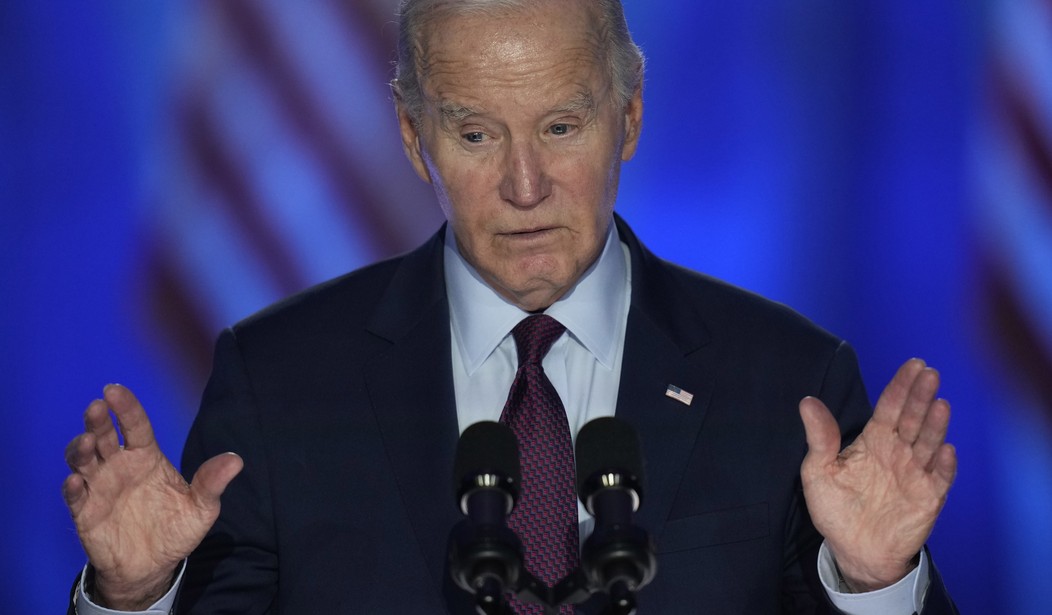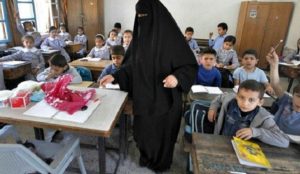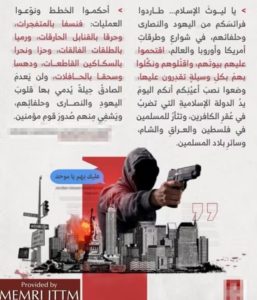No one with any familiarity with the Qur’an or Islamic tradition, as well as Islamic law, could honestly claim this. Yes, jihad means “struggle,” and there are as many uses of the word in Arabic with as many different connotations as there are of “struggle” in English. However, the primary understanding of jihad in traditional Islamic theology is warfare against unbelievers for the purpose of destroying non-Sharia governments and imposing Sharia.
This is clear from the teachings of the four principal schools of Sunni jurisprudence:
Shafi’i school: A Shafi’i manual of Islamic law that was certified in 1991 by the clerics at Al-Azhar University, one of the leading authorities in the Islamic world, as a reliable guide to Sunni orthodoxy, stipulates about jihad that “the caliph makes war upon Jews, Christians, and Zoroastrians…until they become Muslim or pay the non-Muslim poll tax.” It adds a comment by Sheikh Nuh Ali Salman, a Jordanian expert on Islamic jurisprudence: the caliph wages this war only “provided that he has first invited [Jews, Christians, and Zoroastrians] to enter Islam in faith and practice, and if they will not, then invited them to enter the social order of Islam by paying the non-Muslim poll tax (jizya)…while remaining in their ancestral religions.” (‘Umdat al-Salik, o9.8).
Of course, there is no caliph today, and hence the oft-repeated claim that the Islamic State (ISIS) and other jihad groups are waging jihad illegitimately, as no state authority has authorized their jihad. But they explain their actions in terms of defensive jihad, which needs no state authority to call it, and becomes “obligatory for everyone” (‘Umdat al-Salik, o9.3) if a Muslim land is attacked. The end of the defensive jihad, however, is not peaceful coexistence with non-Muslims as equals: ‘Umdat al-Salik specifies that the warfare against non-Muslims must continue until “the final descent of Jesus.” After that, “nothing but Islam will be accepted from them, for taking the poll tax is only effective until Jesus’ descent” (o9.8).
Hanafi school: A Hanafi manual of Islamic law repeats the same injunctions. It insists that people must be called to embrace Islam before being fought, “because the Prophet so instructed his commanders, directing them to call the infidels to the faith.” It emphasizes that jihad must not be waged for economic gain, but solely for religious reasons: from the call to Islam “the people will hence perceive that they are attacked for the sake of religion, and not for the sake of taking their property, or making slaves of their children, and on this consideration it is possible that they may be induced to agree to the call, in order to save themselves from the troubles of war.”
However, “if the infidels, upon receiving the call, neither consent to it nor agree to pay capitation tax [jizya], it is then incumbent on the Muslims to call upon God for assistance, and to make war upon them, because God is the assistant of those who serve Him, and the destroyer of His enemies, the infidels, and it is necessary to implore His aid upon every occasion; the Prophet, moreover, commands us so to do.” (Al-Hidayah, II.140)
Maliki school: Ibn Khaldun (1332-1406), a pioneering historian and philosopher, was also a Maliki legal theorist. In his renowned Muqaddimah, the first work of historical theory, he notes that “in the Muslim community, the holy war is a religious duty, because of the universalism of the Muslim mission and (the obligation to) convert everybody to Islam either by persuasion or by force.” In Islam, the person in charge of religious affairs is concerned with “power politics,” because Islam is “under obligation to gain power over other nations.”
Hanbali school: The great medieval theorist of what is commonly known today as radical or fundamentalist Islam, Ibn Taymiyya (Taqi al-Din Ahmad Ibn Taymiyya, 1263-1328), was a Hanbali jurist. He directed that “since lawful warfare is essentially jihad and since its aim is that the religion is God’s entirely and God’s word is uppermost, therefore according to all Muslims, those who stand in the way of this aim must be fought.”
The Shi’ites have substantially the same understanding. This is also taught by modern-day scholars of Islam. Majid Khadduri was an Iraqi scholar of Islamic law of international renown. In his book War and Peace in the Law of Islam, which was published in 1955 and remains one of the most lucid and illuminating works on the subject, Khadduri says this about jihad:
The state which is regarded as the instrument for universalizing a certain religion must perforce be an ever expanding state. The Islamic state, whose principal function was to put God’s law into practice, sought to establish Islam as the dominant reigning ideology over the entire world….The jihad was therefore employed as an instrument for both the universalization of religion and the establishment of an imperial world state. (P. 51)
Imran Ahsan Khan Nyazee, Assistant Professor on the Faculty of Shari’ah and Law of the International Islamic University in Islamabad. In his 1994 book The Methodology of Ijtihad, he quotes the twelfth century Maliki jurist Ibn Rushd: “Muslim jurists agreed that the purpose of fighting with the People of the Book…is one of two things: it is either their conversion to Islam or the payment of jizyah.” Nyazee concludes: “This leaves no doubt that the primary goal of the Muslim community, in the eyes of its jurists, is to spread the word of Allah through jihad, and the option of poll-tax [jizya] is to be exercised only after subjugation” of non-Muslims.

“Jihad just means struggle, not holy war – New York City Education Department’s training sessions try to whitewash Jihadi hate crimes,” OpIndia, February 29, 2024:
On Tuesday, 27th February, New York City’s Department of Education (DOE)’s training sessions for teachers on understanding and combating anti-Muslim bias sparked controversy as it propagated that jihad means “struggle” and “effort” rather than a synonym for holy war. Jewish Chronicle first reported the sessions that led to a divide among the educators and the broader community. The Jewish teachers who attended the session in question titled “Understanding Muslim Experiences and Combating Anti-Muslim Bias” criticized the portrayal of concepts such as jihad and the interpretation of Sharia law.
The DOE’s training sessions are part of a more extensive anti-discrimination program where educators learn about different concepts. In these sessions, the educators were informed that jihad primarily signified “struggle” or “effort” rather than being a synonym for holy war. The examples that were used to explain jihad included personal struggles for fitness or building friendships, which practically detached the term from its violent associations with extremist groups. “Jihad is the Muslim concept of striving in the path of God,” the host reportedly said.
As per the New York Post’s report, some of the examples of explaining jihad during the sessions included “My jihad is to never settle short of my best effort”, “My jihad is to not judge people by their cover”, and “My jihad is to build friendship across the aisle”. The portrayal of jihad neglected the complexity of the issue and the historical use of the term to promote violence.
Another educator told the New York Post, “Jihad may mean struggle, but it’s disingenuous to omit that it is commonly used to mean holy war and then to say that the media outlets who use it that way just control the narrative.”
Jewish educators and critics voiced concerns over the interpretation. One of the Jewish teachers remarked that such re-definitions have potential danger to society and said, “They are trying to normalize jihad, but we have to address the elephant in the room; that for many radical Muslims, it means violence. It’s like genocide doesn’t mean genocide anymore, and terrorist means freedom fighter. When someone hears a word like jihad, they now associate it with a struggle to go to the gym rather than violence. How will they be able to spot dangerous and violent ideologies?”
Their sentiments reflected a broader apprehension that DOE might want to inadvertently obscure the understanding of the radical ideology in the classrooms. Moreover, discussion on Sharia law during the sessions also faced criticism as it overlooked the stringent applications in specific regimes. For example, there are documented incidents of brutal punishments and human rights violations where Sharia law is in place. The moderators who conducted the sessions focused on personal religious observance of Sharia. However, educators attending the sessions felt they failed to address the complex realities and criticisms of Sharia law and its broader implications on society.
These sessions are being held in the aftermath of the Palestinian Islamic terrorist organization Hamas’s terrorist attack in Israel in October 2023, killing over 1,300 people, including women, children, elderly and foreigners. DOE has also planned workshops on antisemitism, but that does not mean that the department should be allowed to water down the real-world implications of jihad and Sharia law.
Jewish teachers living in New York City have reported that they experienced antisemitism and bias, underscoring the concerns about their safety. The lack of action from the administration over such behavior has led to a significant challenges for the Jewish community.
MyJihad campaign to ‘reclaim jihad’
The “MyJihad” campaign was conceptualized in 2012 by Ahmed Rehad [actually Rehab], executive director of the Council on American-Islamic Relations (CAIR) Chicago. Reportedly, the aim was to reclaim the term from “extremists”. The campaign encouraged Muslims and non-Muslims alike to use the hashtag “MyJihad to reflect the “spiritual struggle” within. One of the phrases used during the campaign was “#MyJihad: modesty is not a weakness. What’s yours?” It featured a Muslim woman wearing a hijab and carrying a dumbbell.
MyJihad’s Facebook page has been running a “Free Palestine” campaign. Interestingly, CAIR is a Hamas-linked organization that has extensively worked on whitewashing crimes done in the name of jihad. In January 2023, the organisation asked the USA to stop using the term “terrorist watchlist” as it contained primarily Muslim names. In December 2022, CAIR‘s Ibrahim Hooper blamed “Hindutva” and “Islamophobia” in India after a mob of Muslims beat a Muslim couple for watching the Kannada film Kantara. It was propagated that Hindus beat up the couple, but in reality, it was a Muslim mob that attacked them….









